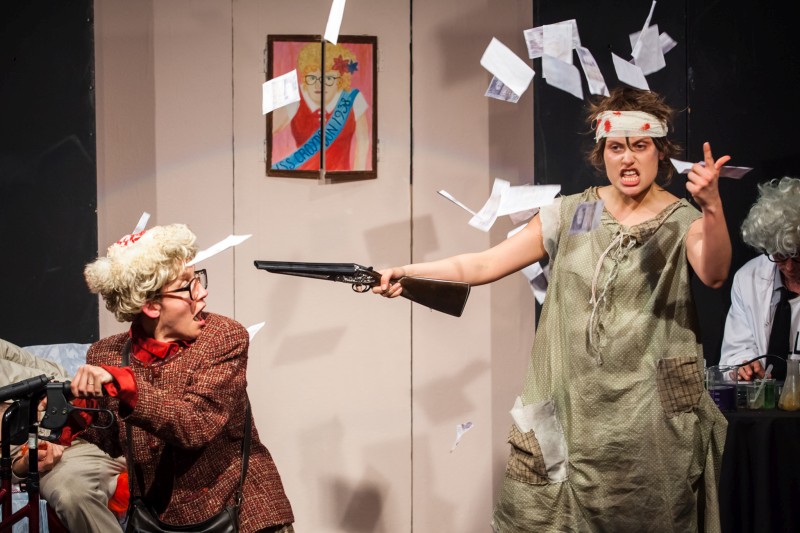 Ostensibly, Wolf Meat follows an all-too-familiar contemporary plot: an overbearing drug lord, a grandson seeking love at the expense of family, a harassed maid plotting the family’s downfall, and an undercover cop looking to take them all down. This, however, is where familiarity ends. The drug lord is an incestuously-motivated grandmother, her grandson, Wolfie, a repressed and hapless manchild, their maid a wild-eyed psychopath and the cop, a butch lesbian with her own theme tune, Dawn Taylor.
Ostensibly, Wolf Meat follows an all-too-familiar contemporary plot: an overbearing drug lord, a grandson seeking love at the expense of family, a harassed maid plotting the family’s downfall, and an undercover cop looking to take them all down. This, however, is where familiarity ends. The drug lord is an incestuously-motivated grandmother, her grandson, Wolfie, a repressed and hapless manchild, their maid a wild-eyed psychopath and the cop, a butch lesbian with her own theme tune, Dawn Taylor.
The link to Little Red Riding Hood is hard to fathom, the story bearing little similarity to the fairy tale and the characters referencing it in name only. Suffice to say that this play was not for children. The audience are led into the first act by Grandma who both directs and acts out the series of increasingly unlikely events in her Croydon sitting room, the play-within-a-play structure allowing for frequent stops along the way to drop in and out of character to explain, comment, or throw insults at the audience.
Although at first a few jokes seem to miss the mark – doddery old ladies and crude freeze-frame exploits – as the show gets going, the self-referential humour, bizarre tangents, and untold silliness build up to an explosive finale. Both characters and audience are swept briskly along by the plot which manages to hit every conceivable (and inconceivable) scene and trope along the way: musical numbers, drug-fuelled highs and lows, and one startling moment of full-frontal to name just a few. What Grandma’s play might lack in polish or finesse, it certainly makes up for in variety and ambition.
And therein lies much of its humour. Against the domestic and, frankly, libidinous aspirations of Grandma and Wolfie, the grand themes of drugs, murder, and conspiracy are comically out of place; comedy that increases significantly as they try desperately to fill their mundane lives in Hollywood cliché and educate the audience in sophisticated ways of cinematic discourse.
The biggest laughs of the evening, however, come from the interaction between characters and audience which are both frequent and playfully inappropriate. One audience member was invited to ‘quality check’ an unknown substance, while another was given the power of life or death over a character and subsequently made the wrong decision. With a small audience (only 50 or so per performance) any interaction implicates the whole group by association, and once brought into the world of the play, willingly or otherwise, the audience more easily laughs along with its silliness rather than at it.
The use of props, sound, and light throughout was clever and inventive with no opportunity for humour wasted – even their limitations proving a self-referential delight. In one scene Wolfie stops to assess the value of their most expensive prop (a solitary pot plant transforming living room into a park) with a view to returning it for a refund after the show’s run – amusing and potentially true?
Over the course of the hour, the actors keep the story moving with enormous energy with Carla Espinoza’s maid Luna providing the best moments including a hilarious and excruciating turn that would give Meg Ryan a run for her money in that scene from When Harry Met Sally.
Overall, Wolf Meat is a wickedly funny production; irreverent, absurd and very entertaining.
